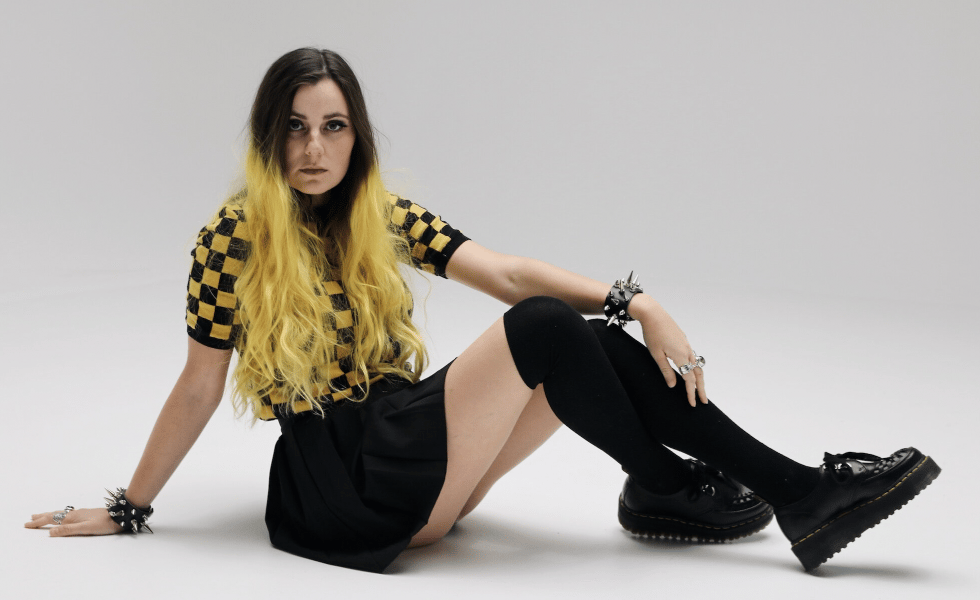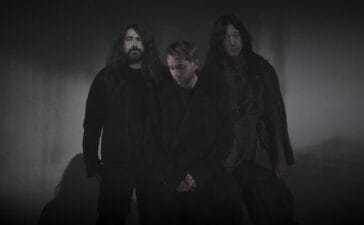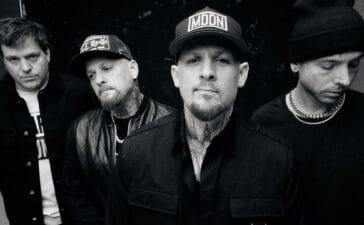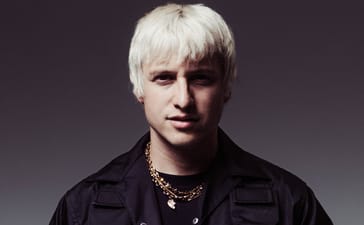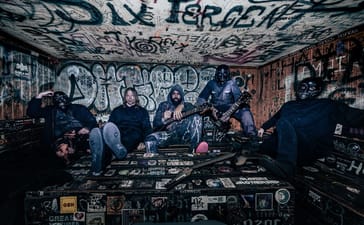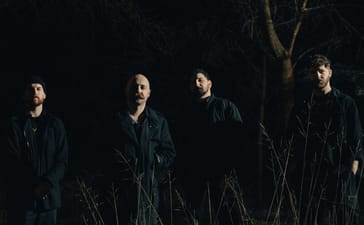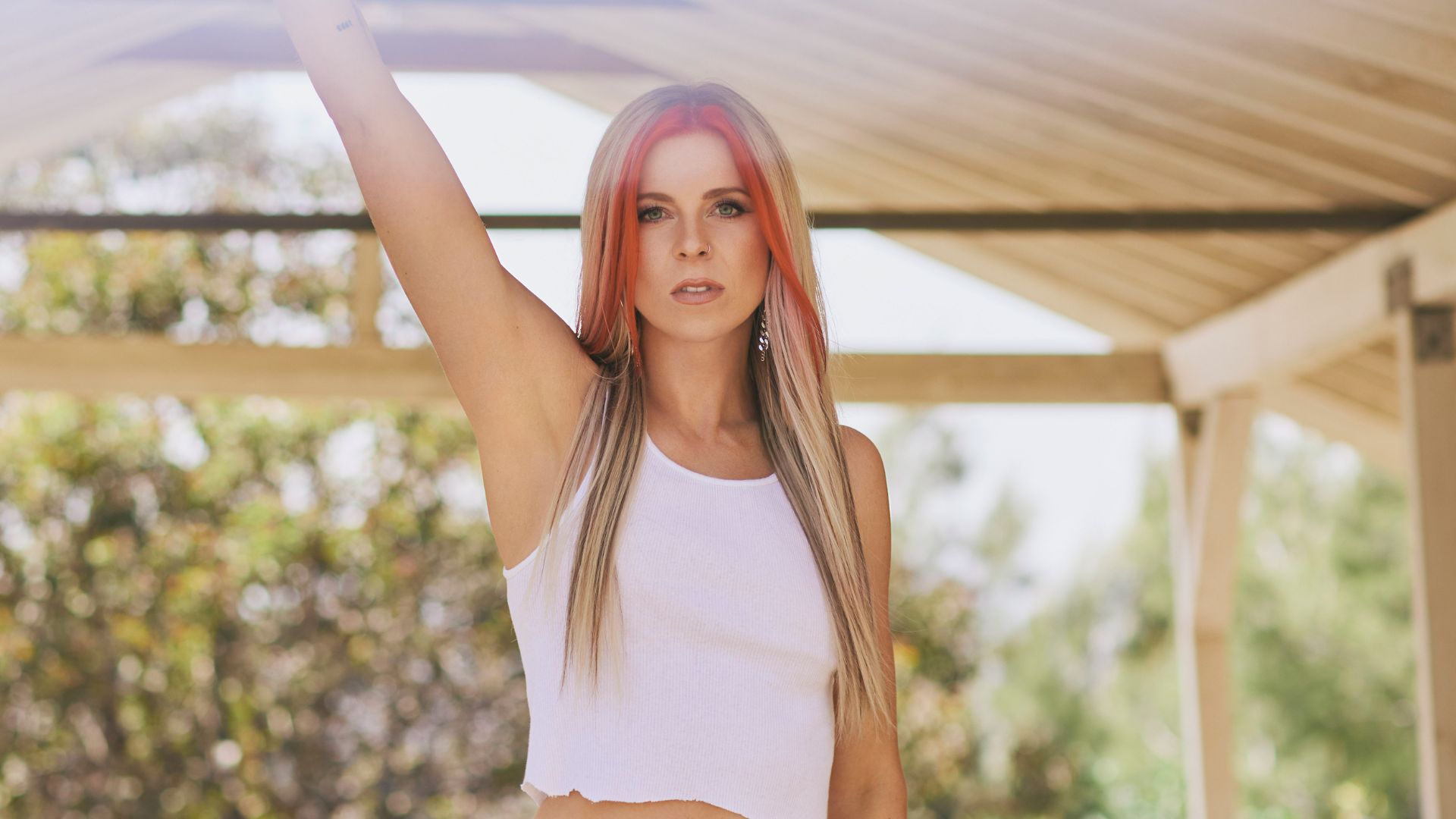It’s been a big few years for mononymous emo-pop luminary AViVA, to say the very least.
It was just a few days shy of seven years ago that our heroine made her debut, dropping the single ‘Crystaleyes’ in September of 2014. Three years of silence followed, but when AViVA returned, she did so with less of a reintroduction, and more of a cataclysmic crash-landing right into the top tier of Australia’s emo-pop echelon. The track she made her mark with then was ‘Grrrls’, which caused even the most synth-adverse among us to whip their heads around in awe. We’ve been treated to a total of 21 singles since then – all released standalone, with the first ten (plus ‘Grrrls’, of course) compiled into the disc aptly titled Volume 1 – the most recent of which being the prickly, hypnotic ‘Melancholy’.
Though all her songs have been released one by one, they’re each linked by an overarching visual aesthetic, narrative threads and stylistic flourishes that pop back up every so often. They’re all a part of what AViVA describes as her own multiverse, currently spanning music and literature, but eventually spreading to the screen in both cinematic and interactive forms as well. The literary element is her latest endeavour, with her debut novel dropping at the tail end of September (Wednesday 29th, to be exact). It’s called Self/Less, and as Pan Macmillan’s blurb teases, it’s about “a world where self-expression is banned”, “a world where survival is everything”, and “a girl who will be heard”.
That theme of self-expression lies at the core of everything AViVA does. As she tells BLUNT, such is critical in allowing herself to reign with an authentic – and authentically bold – direction that she alone has the power to control.
Self/Less sounds absolutely insane, in all the best ways. How long have you been working on it?
I started writing the first book three-and-a-bit years ago – so yeah, it’s been a long time in the making! There’s three books in the series, and I’ve finished all of them. I’m currently editing book two; the other books didn’t take nearly as long to write. I think that I was trying to figure out the core message that I was trying to say – what is the story, and who are the characters? And now that I’ve got it, it’s just like, “Yeah, easy breezy!” But it didn’t start up easy breezy [laughs].
So wait, is it a trilogy, or are these the first three books in a series that’s going to sprawl well into the future?
The core story is three books. There are some other stories that I want to tell, but right now, the core series is these three books. I wouldn’t call it a trilogy, though – I’d just say there are three books in the main story, and who knows what else might happen?
The press release notes that “Self/Less fulfils a longtime mission of creating [your] own distinct multiverse that seamlessly merges music and literature.” What is that thematic link between what you explore in the books and what you explore in your music?
The main bridge – and it’s the nexus of everything I do in life – is creativity and self-expression. Everything I do is about finding your voice and living a creative life, and music is the way that I express myself the most. I think that comes through in the music – it sounds dark and it sounds heavy, but when you actually listen to the lyrics, you realise that it’s about self-empowerment, it’s about hope and it’s about finding your voice, and not letting people take that away from you.
I think that’s what differentiates my sound from the old-school emo sound, which was a lot of, like, “Poor me, I’m in tears on the floor, drowning in my own misery.” I was hella into that when I was 15, but for me, it reached a point where I was like, “I actually don’t want to be like that anymore. I want to be strong and powerful, and be who I am and not feel sad about it. Why should I feel like I need to be in a puddle on the floor to be me?” I want to encourage people to find their own voice, and find their freedom through that.
“The music is basically a soundtrack to the book series, but I never want to tell people which song goes with which scene, because your life is different to mine…”
I guess traditional emo is sort of like one step in a bigger journey. self-pity is cool for a while, but at some point you have to step back and go, “Okay, I need to get over this.” And I feel like that’s where your music comes in; it’s like the next step – “You’ve wallowed in your sadness, and now it’s time to start moving in a more positive direction.”
Yeah! Well, I guess it’s like, “Get all those emotions out, sing along, dance along in your bedroom, vent, and then not feel like a piece of crap at the end of the day – feel like you can actually go and confront whatever it is that you were feeling crap about in the first place.”
So for longtime fans of your music, are there any easter eggs that people might pick up on in the books? Or vice versa, could someone read the book and then have a wealth of context for the music?
The entire thing is inextricably connected. If you listen to the lyrics, you’ll find that there are little keyholes into the world. The music is basically a soundtrack to the book series, but I never want to tell people which song goes with which scene, because your life is different to mine, and your feelings and experiences are different to mine, so you might go, “This song is for this scene and this chapter, 100 percent!” And who am I to tell you that that’s not the case? Because that’s your story – once you read a book, it becomes yours, because you’re experiencing the story through the characters.
I think what makes great art is being able to have mediums that stand on their own, but are enhanced by each other. And that’s what my music and my novel do: they exist on their own. So you could listen to the music, never pay attention to anything about the book – not care, not read it – and it’s still fantastic music that has a message and has meaning behind it. And the same goes for the book – but with their powers combined, you get an enhanced experience with more depth, and it’s more fun because of all the easter eggs that I’m hiding; all my teasers for the songs have little secrets for the story and the world. I’m really into world-building and experiential living, so everything I do is very holistic.
How far do you want to take that holistic multiverse in the long run? Do you think there’s potential to expand into things like visual media?
Yeah, I’m currently talking about serialising it for TV – film and TV, but TV is obviously a preference – and also a video game. My community is very gamer-centric, and I like to game too, and the story itself really lends itself to gaming. My music lends itself to gaming, too – a game’s soundtrack needs to be cinematic, I think, and I always try to create a cinematic three-minute song.
On that note, congratulations on the release of ‘Melancholy’! How do you feel now that it’s out there in the wild?
I feel good! I like it when people can hear the songs, because there’s only so much you can do just hearing it yourself – I mean, it gets a bit boring when other people aren’t listening, so it’s good to have it out there. The feedback has been really positive, which is always a good thing. The song is a bit different because like we were saying with the emotional side of it, it seems from the outset like it’s really dark and it’s quite a somber song – melancholy itself is not, like, a great feeling – but to me, the song is about what happens next; you feel melancholy, and then what?
The line, “Things will never be the same,” to me, is actually really empowering. You might interpret that as, “Things will never be the same, and that means nothing’s going to be good again,” but you could also look at it as, “Things will never be the same, because I’m a new person – I’ve learnt something from this terrible experience, and I won’t make those mistakes again,” or, “I won’t let myself be treated that way again.” And so that’s why I think the song stands on its own a little bit from a mood perspective, but it definitely still has that same sort of visceral AViVA-ness – I mean, “Feels like I’ve got blood on the brain” is just classic me [laughs].
“The original concept of an album cannot exist in today’s culture, because the culture of the album doesn’t exist.”
The way you release music is super unique. Where did the concept come from, to drip-feed tracks every few months?
The original concept of an album cannot exist in today’s culture, because the culture of the album doesn’t exist. The idea of pre-ordering and going to a music shop, getting a physical copy of something and going home, listening to it, taking it on a car trip… That doesn’t exist anymore.Because there is so much media, and there is so much content, and it’s all instantly accessible. What the album was doesn’t exist anymore. Once upon a time, you’d get an album and there would be three singles, and ten songs that are good if you’re a mega-fan, but not really amazing – and I think you can’t afford to do that anymore. That’s lazy songwriting.
Every song I write is a single, and if it’s not a single, it doesn’t make it past the initial 90 minutes I spend writing it. And I think that’s what creates good work, because y’know, you have to meet a particular standard. You want a compilation of songs that sound rad, not a compilation of songs where you’re like, “Ah, I love that one and I love that one, but those ones are… Meh.” And that’s how I feel about albums these days. When I listen to other people’s albums, I’m like, “There’s only three good songs on this, why were they being lazy?” You can’t afford to do lazy songwriting in 2021, because it’s just not the same environment that it was. Kids these days… Literally, those words just came out of my mouth and I wasn’t being ironic [laughs]. But yeah, kids these days will never have that experience. They just won’t.
There’s also the benefit that none of the songs you put out there get lost in the mix, right? Every one gets its own dedicated stint of attention.
Definitely! And I think that’s important – if you put effort into creating something, you want it to get the attention it deserves. And I don’t think an album gives every song the attention they deserve.
But when it comes to the Volume compilations, is there an intentional vision behind how the tracks work in succession?
Yeah. Every song links to the other songs. Aside from the book, I can hear the storyline in the music on its own – from a musical perspective, you can hear the way each song flows into the next, and I think that’s really important. I think what makes those compilations special is the fact that as a listener, you get to hear the order I’ve put them in, and that’s not necessarily their order of release – it’s the order of intent. Those are the little things that I find interesting – you don’t have to put the songs out in the order that they came together, you put them out in the order that they need to be to exist.
‘Melancholy’ is out now via Island / Universal
Self/Less is out September 29th via Pan Macmillan


